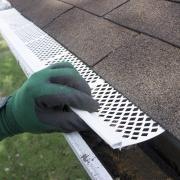Gutter Guards and Their Benefits
Basically there are two types of gutter guards, metal and foam. These are both used in order to protect your roof and your home from falling debris. You can also install brush guards on your gutters.
Foam gutter guards
Unlike mesh gutter guards, foam gutter guards are not visible from the ground. They are also quite inexpensive. They come in a variety of styles and sizes.
If you’re looking for a solution to protect your gutters from leaves and other debris, foam gutter guards are a great option. They can last for up to three years if they’re properly installed. They’re also extremely easy to install. You can purchase them in a wide variety of sizes, including half round and K-style models.
However, if you’re interested in a more permanent solution, you may want to consider mesh gutter guards. They’re cheaper, and they tend to be more effective.
If you don’t have time to do it yourself, you can hire a handyman to help you install your new foam guard. They’ll be able to determine the right size for your gutters, and they’ll be able to install it in no time.
You’ll also want to find a high-quality foam gutter guard. Ideally, you should look for something that has a UV coating, as well as antimicrobial properties. The latter will prevent the growth of moss and insect larvae.
One of the most noticeable advantages of foam gutter guards is how easy they are to install. You can purchase them in varying sizes, and you can even cut them to fit your gutters.
Metal gutter guards
Purchasing a metal gutter guard is a smart move to protect your home from bushfire embers. These embers are flammable and can travel long distances. When they reach dry materials in the gutter, they may ignite and cause fires.
Metal gutter guards are a good choice for homeowners who live in areas where there is a high risk of bushfires. These are made of steel, aluminum, or copper. These materials are stronger than plastic and less likely to rust.
Another benefit of metal gutter guards is their ability to keep out small debris. In areas that have heavy rainfall or windy conditions, the gutter system can become clogged with leaves and yard debris.
This can lead to overflowing water, which can damage the foundation of your house or damage nearby soil. It can also destroy your roof timbers and walls.
A micro-mesh gutter guard is an easy-to-install solution. It is made of durable stainless steel and features ultra-tiny holes to keep small debris out of the gutter.
Other metal gutter guards include perforated screens made of aluminum and stainless steel. These screens are designed to allow water to flow freely but aren’t as rugged as a stainless steel guard. They can blow off during heavy rain or wind.
Some are made of foam, which is not as durable as metal. The material can warp in harsh climates and can break over time.
Brush gutter guards
Using brush gutter guards is a popular solution.
A brush guard is made from large polypropylene bristles. These bristles can get caught on smaller debris and make it impossible for the water to flow. This can lead to clogging, and potentially damage to the gutter.
These guards also collect leaves and other small debris and may need to be cleaned periodically. Keeping the gutters clean is an important part of protecting your home. Not only does it keep your gutters free from clogs, but it also prevents mold and fungus from growing.
Other types of gutter guards include metal screens, which are made from aluminum or stainless steel. These screens have tiny holes. They are designed to let water flow freely. They are also made to fit under the shingles. They can sometimes blow off during heavy rain, but are generally a good choice.
Another type of guard is a sponge guard. These are designed to sit inside the gutter and allow water to flow through them. They are a little more difficult to clean than brush guards, but can be less expensive.






